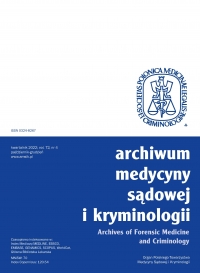The overview of forensic genetic genealogy
The overview of forensic genetic genealogy
Author(s): Urszula Rogalla-ŁadniakSubject(s): Criminology
Published by: Wydawnictwo Uniwersytetu Jagiellońskiego
Keywords: forensic genetics; investigative genetic genealogy; familial searching;
Summary/Abstract: Forensic genetic genealogy (FGG) benefits largely from popularity of genealogical research within (mostly) American society and the advent of new sequencing techniques that allow typing of challenging forensic samples. It is considered a true breakthrough for both active and especially cold cases where all other resources and methods have failed during investigation. Despite media coverage generally highlighting its powers, the method itself is considered very laborious and the investigation may easily got suspended at every stage due to many factors including no hits in the database or breaks in traceable lineages within the family tree. This review summarizes the scope of FGG use, mentions most concerns and misconceptions associated with the technique and points to the plausible solutions already suggested. It also brings together current guidelines and regulations intended to be followed by law enforcement authorities wishing to utilize genetic genealogy research.
Journal: Archiwum Medycyny Sądowej i Kryminologii
- Issue Year: 72/2022
- Issue No: 4
- Page Range: 211-222
- Page Count: 12
- Language: English

